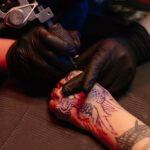Getting a tattoo is a form of self-expression, but if you have eczema, you might wonder, Can You Get A Tattoo With Eczema? At tattooat.com, we explore the intersection of skin art and skin health, providing guidance to help you make informed decisions about body art while managing your eczema symptoms, ensuring a safe and satisfying tattooing experience, and highlighting skin sensitivity considerations. Learn about minimizing potential eczema flare-ups and ensuring your tattoo heals beautifully with our comprehensive guide.
1. Understanding Eczema and Tattoos
Eczema, also known as atopic dermatitis, is a chronic skin condition characterized by inflammation, itching, and dry skin, affecting millions worldwide. Tattoos, on the other hand, involve injecting ink into the dermis layer of the skin to create permanent designs. Getting a tattoo with eczema requires careful consideration due to the potential risks involved.
1.1. What Is Eczema?
Eczema is a common, long-term skin condition that causes the skin to become itchy, red, dry, and cracked. According to the National Eczema Association, it affects over 31.6 million Americans. Eczema isn’t contagious, but it can be uncomfortable and affect your quality of life. The condition is often linked to genetics, immune system dysfunction, and environmental triggers.
1.2. The Tattooing Process: A Brief Overview
The tattooing process involves using a needle to insert ink beneath the outer layer of your skin. This creates a permanent design as the ink settles into the dermis, the layer of skin beneath the epidermis. For individuals with eczema, this process can present unique challenges.
1.3. Why Eczema Can Complicate Tattooing
Eczema can complicate tattooing due to the skin’s increased sensitivity and compromised barrier function. When getting a tattoo, the skin undergoes trauma, which can trigger eczema flare-ups. Additionally, the dyes used in tattoos can sometimes cause allergic reactions, further complicating the healing process.
2. Key Considerations Before Getting a Tattoo with Eczema
Before deciding to get a tattoo, individuals with eczema should carefully consider several factors to minimize potential complications.
2.1. Consultation with a Dermatologist or Allergist
Before getting a tattoo, consulting with a dermatologist or allergist is crucial. These specialists can evaluate your skin condition, assess the severity of your eczema, and provide personalized recommendations. They can also help you identify potential allergens and irritants to avoid.
2.2. Timing Is Everything: Avoiding Flare-Ups
It’s best to avoid getting a tattoo during an eczema flare-up. According to Dr. Peter Lio, a dermatologist at Northwestern University’s Feinberg School of Medicine, even a flare-up in a distant area can affect the skin’s overall inflammation. Waiting until your eczema is well-managed can reduce the risk of complications.
2.3. Location, Location, Location: Choosing the Right Spot
Choosing the right location for your tattoo is essential. Avoid areas prone to eczema flare-ups, such as the elbows, knees, and neck. Opt for areas with relatively clear skin and minimal history of eczema.
2.4. Patch Testing: A Must-Do
Before committing to a full tattoo, it’s recommended to get a patch test. This involves tattooing a small dot of the desired ink and monitoring for any adverse reactions. According to Sarah Walls, the office manager of Wonderland Tattoos in Portland, Oregon, patch tests are a common practice to ensure customer safety.
 Patch test for tattoo ink to identify allergic reactions
Patch test for tattoo ink to identify allergic reactions
2.5. Medical Conditions and Medications
Certain medical conditions and medications can impact the tattooing process and healing. For example, Dr. Ari Zelig, an allergist based in Miami, Florida, advises against getting a tattoo if you are taking isotretinoin (Accutane) or have a history of keloid formation. Always disclose your medical history to your tattoo artist and dermatologist.
3. Finding the Right Tattoo Artist
Selecting an experienced and knowledgeable tattoo artist is critical for individuals with eczema.
3.1. Experience with Eczema or Sensitive Skin
Ideally, your tattoo artist should have experience working with clients who have eczema or sensitive skin. They should understand the unique challenges and take necessary precautions.
3.2. Portfolio Review and Referrals
Review the artist’s portfolio to assess their skills and style. Look for examples of their work on diverse skin tones and conditions. Additionally, ask for referrals and speak with previous clients to gauge their experiences.
3.3. Cleanliness and Hygiene Standards
Ensure that the tattoo studio adheres to strict cleanliness and hygiene standards. The studio should be licensed and inspected regularly. The artist should use sterile equipment and follow proper sanitation protocols.
3.4. Hypoallergenic Inks and Products
Inquire about the types of inks and products used by the artist. Opt for hypoallergenic, non-toxic inks and allergy-friendly soaps and moisturizers. Latex-free gloves are also essential to avoid potential allergic reactions.
4. The Tattooing Session: What to Expect
During the tattooing session, it’s essential to communicate openly with your artist and take necessary precautions.
4.1. Pre-Appointment Preparations
The night before your appointment, get a good night’s sleep, stay hydrated, and avoid alcohol and sunburn. On the day of the appointment, eat a full breakfast and avoid taking aspirin or ibuprofen, as they can thin the blood.
4.2. Communication with the Artist
Communicate your concerns and preferences to the artist. Inform them about your eczema and any allergies or sensitivities you may have.
4.3. Monitoring Skin Reactions
During the session, monitor your skin for any adverse reactions, such as excessive redness, swelling, or itching. If you notice anything unusual, inform the artist immediately.
5. Aftercare: Ensuring Proper Healing
Proper aftercare is crucial for preventing infections and promoting healing.
5.1. Immediate Aftercare
After the tattoo is complete, apply petroleum jelly and cover the area with a bandage. Keep the bandage on for at least three days, or as recommended by your artist.
5.2. Cleaning and Moisturizing
Gently clean the tattoo with a mild, fragrance-free soap and pat it dry with a paper towel. Apply a thin layer of hypoallergenic moisturizer to keep the skin hydrated.
5.3. Avoiding Irritants
Avoid using harsh soaps, lotions, or ointments that may irritate the skin. Steer clear of scented products and those containing alcohol or dyes.
5.4. Sun Protection
Protect your tattoo from sun exposure by wearing loose-fitting clothing or applying a broad-spectrum, fragrance-free sunscreen.
5.5. Monitoring for Infection
Watch for signs of infection, such as increased redness, swelling, pain, or pus. If you suspect an infection, seek medical attention immediately.
6. Potential Risks and Complications
While tattoos can be a form of self-expression, it’s essential to be aware of the potential risks and complications, especially for individuals with eczema.
6.1. Allergic Reactions to Tattoo Ink
Allergic reactions to tattoo ink can occur, leading to itching, rash, and inflammation. Certain colors, such as red and yellow, are more likely to cause allergic reactions.
6.2. Eczema Flare-Ups
The tattooing process can trigger eczema flare-ups, causing increased itching, redness, and inflammation. Managing flare-ups may require topical corticosteroids or other medications.
6.3. Infections
Infections can occur if proper hygiene and aftercare are not followed. Bacterial infections are the most common and may require antibiotics.
6.4. Scarring and Keloid Formation
In some cases, tattoos can lead to scarring or keloid formation, especially in individuals prone to these conditions. Keloids are raised, thickened scars that can extend beyond the original tattoo area.
6.5. Granulomatous Reactions
Granulomatous reactions are a type of chronic inflammation that can occur in response to tattoo pigments. These reactions can be challenging to treat and may require surgical excision of the tattoo.
7. Personal Stories: Tattoos and Eczema
Despite the risks, many individuals with eczema have successfully gotten tattoos and found them to be empowering.
7.1. Alexis Smith’s Experience
Alexis Smith, who lives with moderate-to-severe eczema, has had nine different tattoo sessions over the past seven years. She loves having art on her body and feels that the positive aspects have outweighed the negative.
7.2. Skyler Winfield’s Story
Skyler Winfield got her first tattoo a month after her eighteenth birthday. Growing up, her eczema was always severe, and she felt self-conscious about it. Getting a tattoo made her feel more confident, knowing that people were admiring the artwork on her body instead of her eczema.
 Woman showing off her flower tattoo
Woman showing off her flower tattoo
7.3. Zoe McReynolds’s Perspective
Zoe McReynolds has several tattoos in places where her eczema isn’t too bad. She feels that it has made a real difference to her self-esteem, as she now assumes people are checking out her tattoos rather than staring at her eczema.
8. Tips for Minimizing Risks
To minimize risks, consider the following tips:
8.1. Choose a Reputable Studio and Artist
Select a reputable tattoo studio with experienced artists who understand eczema and sensitive skin.
8.2. Follow Aftercare Instructions Diligently
Adhere to the aftercare instructions provided by your artist and dermatologist.
8.3. Stay Hydrated and Nourished
Maintain a healthy lifestyle by staying hydrated and eating a balanced diet.
8.4. Avoid Scratching or Picking
Resist the urge to scratch or pick at the tattoo, as this can increase the risk of infection and scarring.
8.5. Keep the Area Clean and Dry
Keep the tattoo area clean and dry to prevent bacterial growth.
9. Addressing Common Concerns
Here are some answers to frequently asked questions about tattoos and eczema:
9.1. Can I Get a Tattoo If I Have Eczema?
Yes, but it requires careful planning and precautions.
9.2. What Type of Ink Is Best for Eczema?
Hypoallergenic, non-toxic inks are recommended.
9.3. How Long Does It Take for a Tattoo to Heal?
Tattoo healing typically takes 2-4 weeks.
9.4. What Should I Do If My Tattoo Gets Infected?
Seek medical attention immediately.
9.5. Can I Get a Tattoo on an Area Affected by Eczema?
It’s best to avoid tattooing areas with active eczema.
9.6. Is It Safe to Get a Tattoo If I’m Taking Eczema Medication?
Consult with your dermatologist to assess potential risks.
9.7. How Can I Prevent Eczema Flare-Ups After Getting a Tattoo?
Follow proper aftercare instructions and avoid triggers.
9.8. What Are the Signs of an Allergic Reaction to Tattoo Ink?
Signs include itching, rash, and inflammation.
9.9. Can I Get a Cover-Up Tattoo Over Eczema Scars?
It may be possible, but consult with a dermatologist and experienced artist.
9.10. What Should I Do If I Regret Getting a Tattoo?
Explore tattoo removal options with a qualified professional.
10. Conclusion: Making an Informed Decision
Getting a tattoo with eczema requires careful consideration and planning. By consulting with healthcare professionals, choosing an experienced artist, and following proper aftercare, you can minimize the risks and enjoy your body art. Remember, it’s essential to prioritize your skin health and make informed decisions.
Ready to explore tattoo designs, find talented artists, and learn more about tattoo care? Visit tattooat.com today and discover the world of tattoos safely and confidently. Address: 1825 SW Broadway, Portland, OR 97201, United States. Phone: +1 (503) 725-3000.
